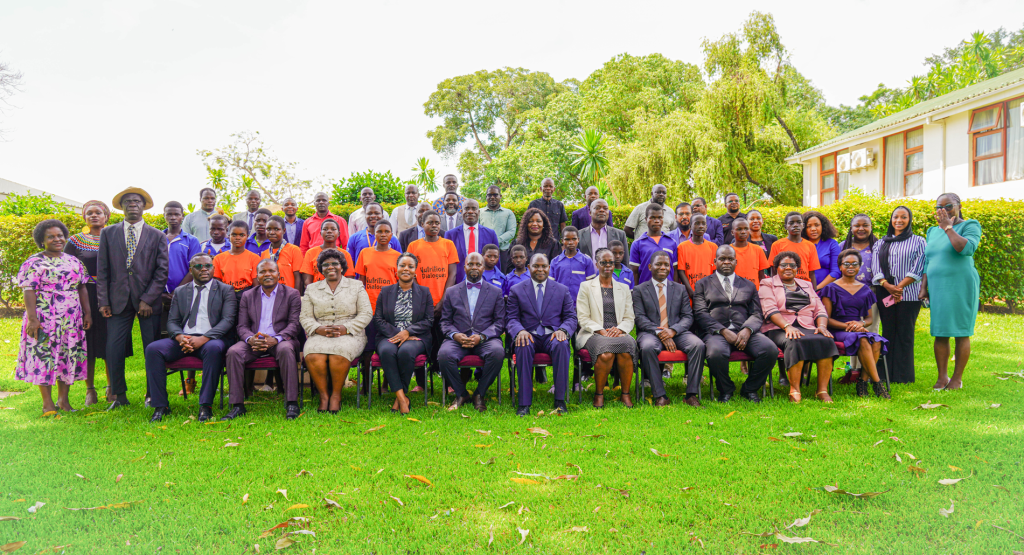
A ceremony attended by Malawi’s Secretary for Education, Dr. Mangani Katundu, on December 5, marked the launch of the expansion strategy for the School Feeding Program in the country, aiming to increase the number of primary schools offering school meals to 100% by 2030. Currently, Malawi has 43% of schools providing at least one meal to students.
“This is a commitment we have made as a Nation, defining concrete actions from all involved—government, community, and strategic partners—to ensure our children have access to school meals. We are capable of building this path together to guarantee education and school feeding. This is our goal with the launch of this Scale Plan,” stated the secretary.
The Centre of Excellence Against Hunger was represented at the ceremony by program officer Maria Giulia Senesi. In her speech, she emphasized that this is a very opportune moment to resume discussions with the country, as a series of international initiatives in the global landscape endorse scaling actions like those in Malawi.
“Through the WFP Centre of Excellence Against Hunger, Brazil’s knowledge and experience in expanding national school feeding programs can offer support to Malawi. By facilitating knowledge exchange, fostering South-South Cooperation, and catalyzing partnerships, the Centre is positioned to promote impactful results in the expansion plan and its actions.”
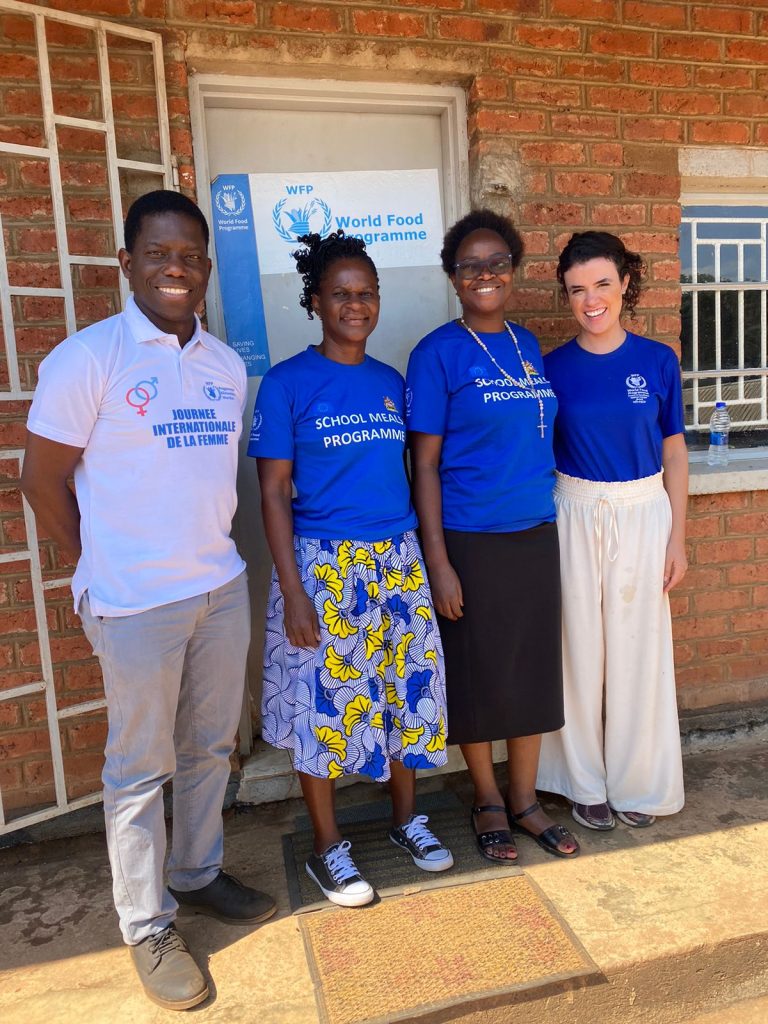
Mission
The launch of the Plan crowns over a decade of collaboration between the WFP Centre of Excellence Against Hunger in Brazil and Malawi in building its school feeding program.
Various events, technical meetings, and missions have been conducted between the two countries. During the most recent mission, in November 2024, Maria Giulia spent three weeks in Malawi, closely monitoring the development of the Expansion Plan.
Over three weeks, Maria Giulia engaged with government representatives, local community members, parents, teachers, and school principals. She shares her experience and how the Centre of Excellence can contribute to the success of Malawi’s Scale-Up Plan.
What was the context of this mission? Did Malawi reach out to Brazil?
The visit stemmed from a meeting with the country office, where we presented our South-South Cooperation activities, considering our historical engagement with Malawi. During the meeting, we spoke with representatives from the country’s Program unit, who recognized the Centre of Excellence’s long-standing support for nations. It was fruitful because when the government of Malawi proposed a Scale-Up Plan for school feeding, the Centre was seen as a key technical and advocacy supporter.
What were the expectations for this mission?
Our focus was on preparations, including drafting a document called a Roadmap, which outlines operational and structural strategies for achieving the goal of strengthening a Scale-Up Plan.
What is Malawi’s Scale-Up Plan?
The Scale-Up Plan is a government initiative to expand school feeding coverage in primary schools from the current 43% to 100% by 2030. It is an ambitious goal.
Our mission aimed to support the country office, the government, other partners, and international organizations with structured actions for this demand. This included preparatory work to understand the technical framework available and designing the Roadmap.
What is our role as the Centre of Excellence in this mission?
The role of the Centre of Excellence is indeed to be an articulator, a facilitator. It serves as a strategic link between what has already been carried out by the country office regarding school feeding and the demands of the national government and local governments.
The scope of action that the Centre of Excellence has is to offer highly specialized technical assistance that focuses on aspects related to school feeding based on local procurement. Within the work of the Centre of Excellence, we monitor movements, whether it’s the initial design of programs, improvements, scaling, or transition plans, where a national government gradually absorbs and implements the provision of school feeding that the WFP has been carrying out in the country.
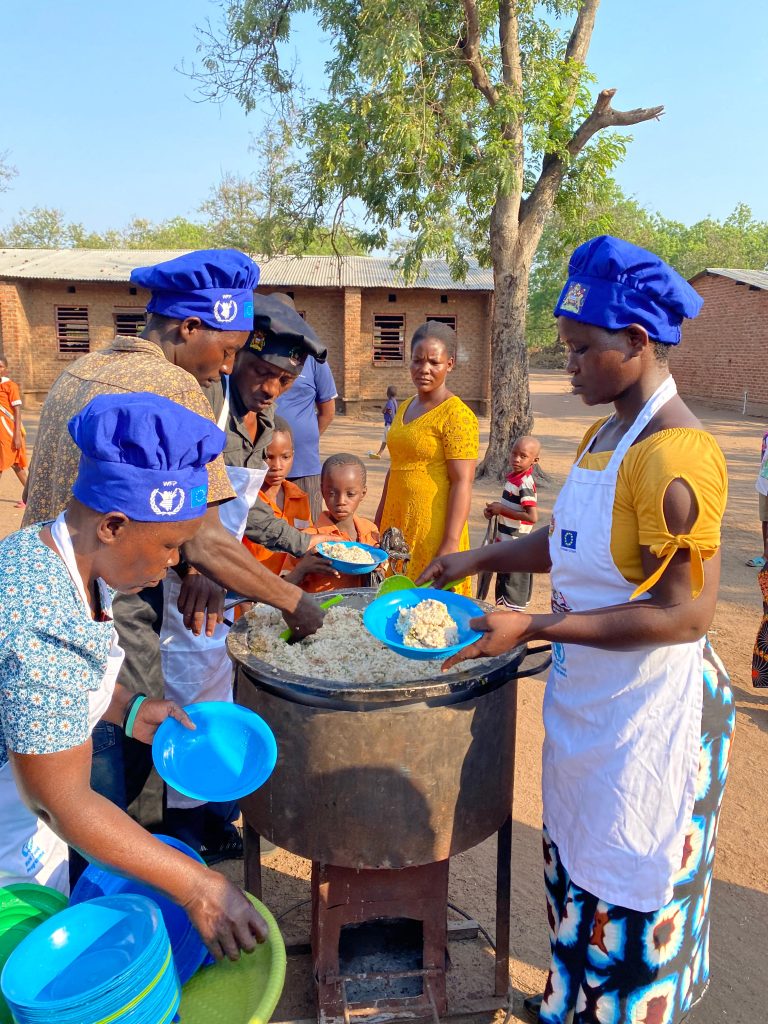
What role does the WFP country office in Malawi play?
The country office directly funds and implements school feeding programs in schools. Through this implementation, 837,500 children in 778 schools receive daily meals, sourced from 35,000 local smallholder farmers. Managing this process—linking local purchases to providing daily school meals—is highly complex, requiring extensive operational management and constant monitoring.
The country office coordinates with national institutions such as the Ministries of Education and Agriculture and regional bodies like departmental secretariats.
How was your interaction with the people of Malawi during your mission?
Prior to and throughout my mission, there was significant support from the country office. It was very interesting because it was a moment when the Centre of Excellence could exchange ideas with other WFP staff in a more direct and fluid manner. From the beginning, I also had a strong dialogue with the national government. On the very first day I arrived, the technical team from WFP, with whom I interacted the most, made a presentation to the directors of the country’s school feeding program, who are based in the Ministry of Education. By the end of the week, I had the opportunity to discuss proposals for the expansion plan with the Minister of Education and the Secretary of Education, who holds the status of deputy minister. Therefore, there were movements of both a technical and political nature to signal to the country’s government that WFP Malawi is seeking strategies to strengthen human resources to meet the demands of the Scale Plan.
And during the field visits?
There was the same type of interaction in the two departments I visited, starting from the second week. We spoke with the governors of the districts of Zomba and Nsanje about the implementation of the school feeding program in the area and how students and the community perceive the program.
During that week, there were local discussions with the principals of the schools we visited, teachers, and enriching meetings with the school feeding committee, which includes parents, students, and representatives from smallholder cooperatives that supply the local school feeding program.
What is the beneficiaries’ perception of the school feeding program in the country?
It is always very enriching to conduct this type of mission and engage in dialogue with the beneficiaries. Their insights are very important for understanding how our work reaches these areas. I would highlight the remarks of a school principal from the district of Zomba. She spoke about the multiple benefits that the school feeding program, with local purchases, brings. She stated that since the program was implemented, there has been a noticeable difference in the reduction of school absenteeism. The guarantee that those students will receive one or two meals a day is very impactful for the community, especially given the high levels of food insecurity in the country. In other words, the objective of food security is also linked to educational goals, providing an additional incentive for children to attend school.
She also emphasized the issue of nutritional quality in what is being provided to the students, as Malawi’s school feeding program advocates for the use of six food groups, including carbohydrates, minerals, vegetables, and proteins, which reflect nutritional diversity.
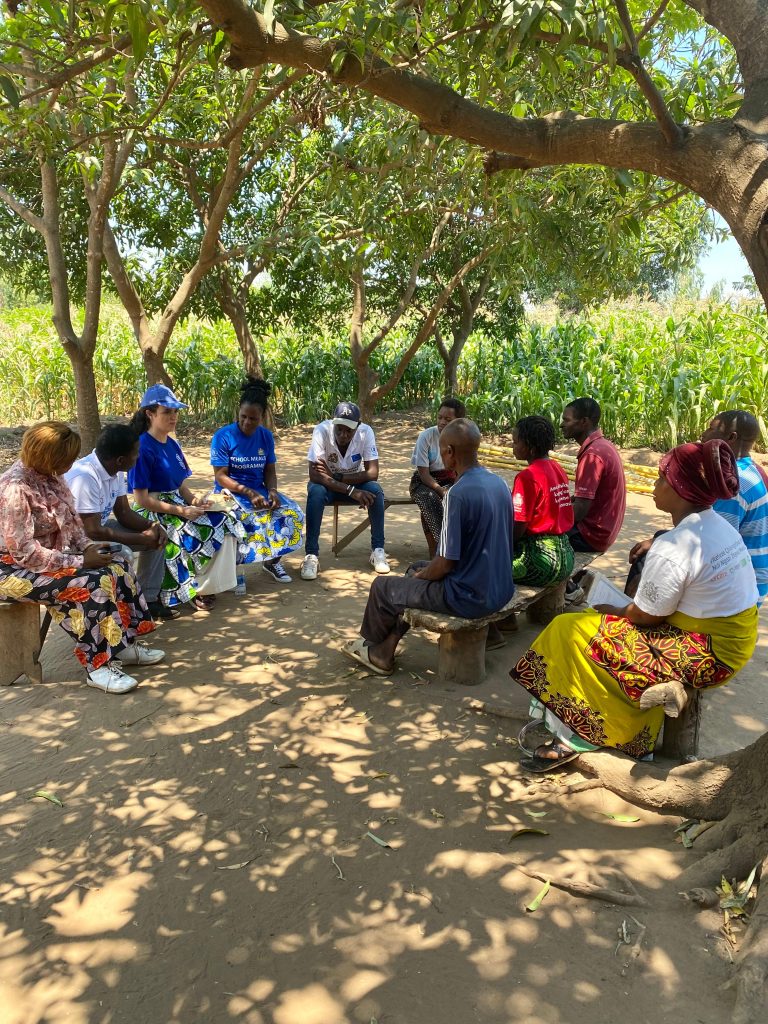
What is the perception of local farmers regarding the school feeding program?
In our conversation with the smallholder farmers, it was clear that the school feeding program represents a more secure market demand for them, accounting for a significant percentage of the sale and distribution of their produce.
Did you notice ties between the Centre of Excellence and Malawi, established over years of contact?
The Country Director, although not the same person from the time of the initial contacts, was already familiar with the Centre’s work. For me, it became clear that there is an institutional history that the Centre has been building over the years. These are ties of collaboration and shared goals aimed at strengthening school feeding programs in the countries we engage with.
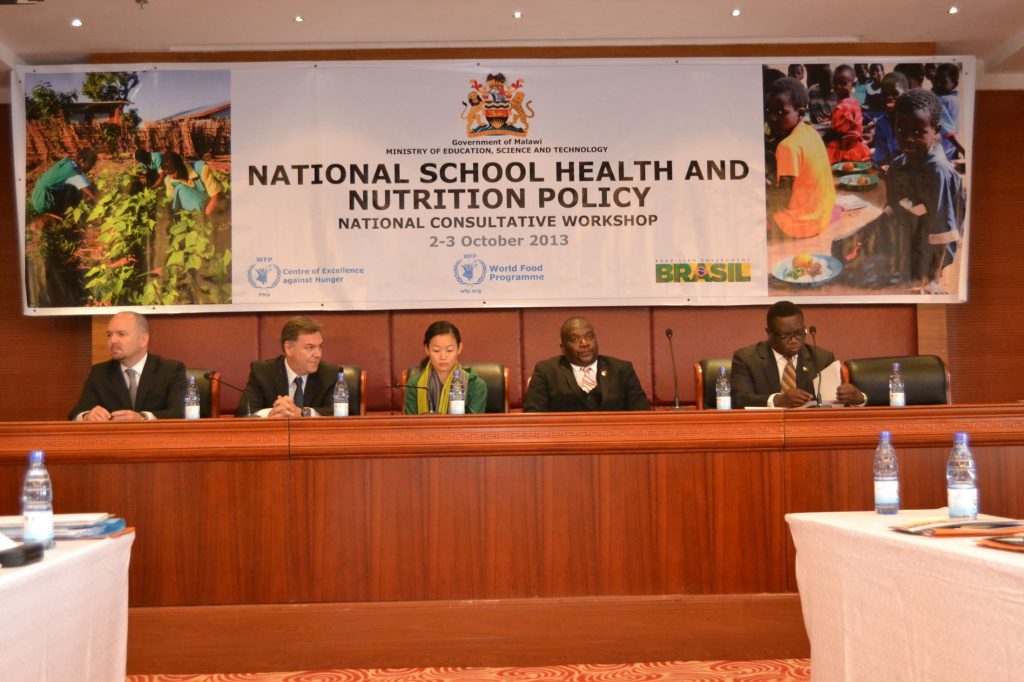
In Malawi’s case, a concrete example of this historical connection was Brazil hosting a national consultation workshop in 2013 to bring together various stakeholders from the agriculture and education sectors to collaborate on building the country’s school feeding program.
Do you consider the Brazil-Malawi relationship as a good example of South-South Cooperation?
Absolutely. It is very interesting to observe that the way Malawi’s school feeding program operates today includes core elements that align closely with what the Brazilian National School Feeding Program (PNAE) advocates and what the Centre of Excellence also promotes as good practice. For instance, 100% of the food products used in the school feeding program are sourced from smallholder farmers. There is a clear connection between the structuring of this approach and the various strategies implemented by the Centre, which have had a medium- and long-term impact on the development of this school feeding policy in Malawi.
Could you elaborate on Malawi’s participation in the School Meals Coalition?
Malawi has been a member of the Coalition since October 2023 but had not yet established its national commitments to the initiative. During our meetings with the Secretary of Education, we were able to present more tangible options for commitments the country could undertake. The understanding was that the national efforts already being promoted were, in fact, actions the government was actively advancing, and formalizing these commitments to the Coalition would be a timely and strategic step.
What political alignment was necessary for the launch of the Scale Plan in 2024?
Several political alignments were required, beginning even before my mission. One of the main points of this articulation was the establishment of a task force that is expected to evolve into a national committee to participatively support actions related to the Scale Plan. In the first meeting of the task force, 16 individuals involved in various aspects of school feeding in the country participated, including representatives from NGOs, the Ministry of Agriculture, and the Ministry of Education.
What are the objectives of the launch of the Scale Plan?
The launch has two main objectives. The first is to present the advocacy study using the Value for Money methodology (from Harvard University), which demonstrates that school feeding is not an expense but an investment that yields a return of 1 to 9. In other words, for every dollar spent, the return is nine dollars, with benefits in food security, public health (reducing cases of anemia), sociological outcomes (increased attendance of girls in schools, lower rates of child marriage), agriculture, and more.
The second objective of this event is to publicly announce that the government aims to increase school feeding coverage from 43% to 100% by 2030 and to communicate that this will be achieved through the Scale Plan and the continued activities of the task force.
What is the biggest challenge for the implementation of the Scale-Up Plan?
I would say it is the sustainability of a multisectoral mobilization, as there is currently no governance body that constantly engages in dialogue between the involved ministries, with clearly defined responsibilities for each party. During my mission, I emphasized the importance of appointing a committee structured in a national document, outlining the commitments and responsibilities of the parties, to ensure involvement and monitoring of this scaling process. A second challenge is the issue of financing, specifically the mobilization of financial resources that are sustainable, enduring, and do not fluctuate over time.
However, we understand that we can tackle all these challenges through dialogue and promoting a participatory process in the construction of solutions.
What are the prospects for joint work with Malawi in the near future?
The Center of Excellence offers a range of activities that are set to be organized for the upcoming year. The most immediate continuation involves providing support in advocacy activities, assisting the country’s participation within the School Feeding Coalition, and strategically monitoring a new WFP staff member assigned to the Ministry of Education for the on-the-ground implementation of the Scale Plan.




